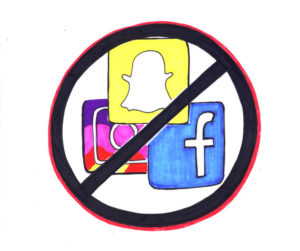The staff editorial is the majority opinion of The Murray State News Editorial Board

The U.S. Supreme Court heard arguments Monday about whether or not a North Carolina law was a violation of the First Amendment.
The law? It’s a peculiar one – one that made having a Facebook account a felony.
In North Carolina, registered sex offenders are not allowed to access social media sites like Facebook, Snapchat and Instagram because of the potential threat they pose to minors on the sites.
While the law may seem like a way to protect children and teenagers from predators on social media, it’s a free speech restriction that might be doing more harm than good.
No parent wants their child to be in the company of a convicted rapist, but not every person who is a registered “sex offender” has committed a heinous crime against another human.
In some states, someone can be deemed a sex offender by some act of public indecency, like urinating in public. An act like that – something drunken fraternity boys probably commit every weekend – is more embarrassing than harmful and doesn’t threaten another person. It’s clearly a less severe crime than molestation, but according to state law, it’s under the same umbrella.
For many sex offenders, they must continue to register themselves for many years after they’ve served time for the crime they committed.
For a fairly innocent offender – like someone who got caught urinating in public – who has met court requirements and fulfilled registration duties year after year, is taking away their free speech via social media justified?
Facebook and other social media platforms are what enables many Americans to communicate with friends and family who may otherwise be unreachable. To take away that vessel, restricting not only a person’s speech, but a person’s ability to communicate with loved ones or find out about significant events, is to strip them of basic human rights.
One of the main criminal justice concerns in the U.S. is how convicts can be reintegrated into society, especially when our prison systems fail to function as rehabilitation centers. If states begin to dehumanize convicts who have served time for minor crimes, how can we expect convicts returning from years in prison for serious crimes to have any hope of normalcy?
Denying a large group of humans the right to behave like law-abiding, “normal” citizens who enjoy sharing cat memes on Facebook is not the answer to preventing abuse on social media.
While criminals who have committed dangerous crimes against other humans should be monitored and not left to loiter around, say, an elementary school, states shouldn’t leave crime prevention up to the perpetrator. In other words, there are many ways education could be used to help children and teenagers become more aware of the problem of cyber danger.
Most children probably have periodic exposure to “stranger danger” talks, but once students reach high school – a time when they might be more likely to encounter potentially dangerous sexual situations – those kinds of educational sessions are not at the forefront anymore.
Like issues of drug abuse or unwanted pregnancy, early and frequent education is a major part of finding solutions that are effective and lasting. If more youths were educated about the online presence of sexual predators – not to mention that certain non-sexual acts could land them a spot on the sex offender registry in their state – there would be less need to implement laws like North Carolina’s that violate the First Amendment and dehumanize people who have already served time.